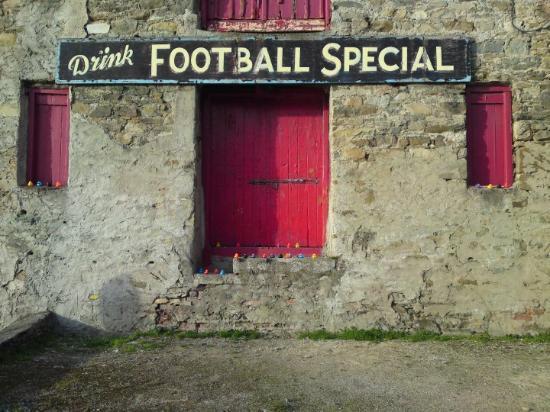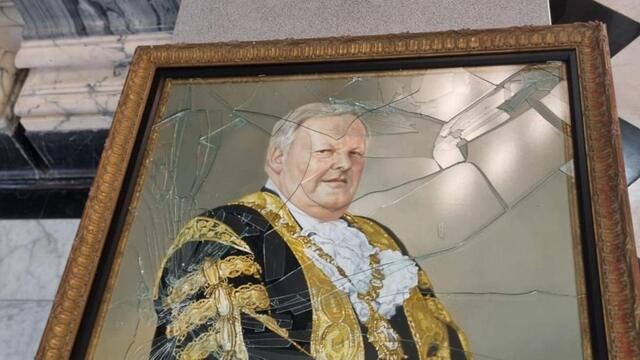THE quickening pace of the debate on Irish unity has combined with the high temperatures this week to spread a certain sense of discombobulation, Squinter feels.
And it wasn’t just in boozed-up and sunburnt feral youths beating the bejaysus out of each other on social media that we saw the rising mercury take its toll. The UTV political round-up show View from Stormont this week turned its attention to the subject of a possible future handover of power at Tayto Castle and a trailer for the programme said: “As demands increase on the Irish government to prepare for Irish unity, we examine what life in the Republic is like."
Now Squinter is all for finding out what places are really like. He longs for instance, to know what life is like in the teeming eastern metropolises of Beijing, New Delhi and Jakarta. He hopes one day to feel the white sand of the Copa Cabana between his toes; explore the underwater wonders of the Great Barrier Reef; swoop in a chopper into the epic vastness of the Grand Canyon; trek the sprawling rhododendron forests of the Himalayas. But with the greatest of respect to the lads at UTV, he’s not in urgent need of a primer on what the pubs are like in Dundalk; the price of coffee in Dublin; what’s in a breakfast roll in the Lifford Centra; or indeed what the roads are like around Sligo.
Perhaps there are people in this loyal little corner of Paradise who have never broken for the border. It may well be that Drogheda is as alien and unknowable to some as the mythical island of Hy-Brasil, its people as exotic and alien to them as the blue aliens from Avatar. It’s possible – just, Squinter supposes, as it’s possible that there are people in Poleglass who keep bees; or just as it’s possible that there are those in the Glens of Antrim who perform the ancient Japanese art of Noh theatre in their gardens.
In the event, the View from Stormont piece on what life is like Where There Be Dragons was a fascinating insight into what the thran, straight-talking and God-fearing folk of Loyal Ulster might expect to see if they ever book a flight to Monaghan with a stopover in Dubai, as the following extract illustrates.
“They are a friendly and simple people, quick to smile but quicker to anger. The acrid smell of turf hangs heavy in the air and life here is lived to a soundtrack of braying donkeys and the rattle of cartwheels on cobblestone. The music in their smoke-filled shebeens is primitive and raw, but for a glass of poitin or a mug of porter they will happily do one of the Ed Sheeran covers they have learned to please the tourists. Their food and drink is basic but nutritious: breakfast rolls from petrol stations; chicken tenders from Supermac’s; Football Specials from Letterkenny sweet shops; cans of Heineken from Dunnes Stores offies.”
Hands across the border – it’s what we need isn’t it?
Across Loyal Ulster the Bible belt is tightening
HOT on the heels of a row over Sunday football, Antrim and Newtownabbey Distr…
What’s that? Tell us more about the Sunday football row thing? Well, fair enough, but be warned – you mind find that your appetite for Loyal Ulster Bible stories may not be as big as you think it is in this year of Our Lord nineteen twenty-three. Sorry, Twenty twenty-three.
The Irish Football Association doesn’t much like Sunday sport. While the rest of the island is hurling, kicking, running, swimming, riding, walking and golfing after not going to church on the Sabbath, the lads at Windsor Avenue have been quite happy with a soccerless status quo wherein the turnstiles are padlocked on the Lord’s Day, the balls and boots left in the kit room and stadium Tannoys given over to playing hymns to empty stands.
But this year something changed. This year it was decided that the Irish Cup Final be played on a Sunday, a decision which offended the Christian sensibilities of quite a few people who took to the usual media outlets to kick off about, well... kicking off. In the vanguard of the opposition was Reverend Alistair Beattie, a Broughshane Presbyterian minister who’s chaplain to Ballymena United, who were soundly beaten by Crusaders in the final. “The Lord’s commandment regarding a day to rest and worship is just as relevant today as in the past,” he said. “The IFA foisted this decision upon the clubs,” he went on, omitting to mention that that the IFA have foisted upon clubs a decision to by-ball Sunday football for the better part of a century. “It was fait accompli and they have not been willing to listen to reasonable objections.”
A WING AND PRAYER: Bible readings before council meetings? Depends where you live, really
Reverend Beattie has not commented so far on whether he thinks that his team were played off the pitch because they were rubbish or because God smote their kicking feet with his righteous wrath.
But you have to agree that the possibility of a plague of locusts descending on This Here Pravince as a result of this IFA slap in the Lord’s bake is a reasonable reason for objecting to the decision. Who on earth wants pestilence, famine or flood as divine retribution when the smell of frying onions drifts heavenwards from the hamburger stands in Windsor Park?
DUP MLA David Hilditch also has skin in the soccer game as he’s an official of his local team, Carrick Rangers.
“If there was a major switch to a Sunday, I'm in trouble, because I'm the only qualified person Carrick Rangers has as a safety officer,” he said, no doubt prompting the Carrick directors to wonder whether Safety Officer College does a Sunday Safety module.
“I'd like to see the final returned to a Saturday 3pm kick-off,” Davy added. “Most of the time, Sunday is one of the only days people get to be with their families. There are many, many people who work five-, six-day weeks now and Sunday is a nice day, whether for a run up the coast or wherever you go to do something with the family. It's my generation, I suppose. It's tradition to be that way.”
Davy’s right, of course, when he says the ban on Sunday soccer has been traditional. But then it was traditional once for centre-forwards to shoulder-charge goalies into the nets at 50mph; for players to used rolled-up newspapers as shin pads; for the RUC to fire plastic bullets at Catholics inside grounds. But things change. Goalkeepers are a protected species; shin pads are two inches long and made out of Kevlar; and the RUC have been given the red card.
Back to Antrim and Newtownabbey Borough Council, where an Alliance Party attempt to have pre-monthly meeting Bible readings in the chamber cancelled was defeated by unionists. The surprisingly close 22-17 vote to keep the readings is a welcome suggestion that the Council might be on the cusp of making a great leap forward into the nineteenth century.
The vote was welcomed by ex-DUP man Jim Wells, a young Earth creationist and formerly an MLA for the constituency of Jericho North.
“I was a councillor on Lisburn Council many years ago and not only was there a Bible reading, but there was a minister present and he prayed for guidance for the councillors,” said Jim. “The two Alliance councillors sat attentively and never raised an eyebrow at this. I can’t see the problem. We still live – in inverted commas – in a Christian country, though I do accept that many people now no longer adhere to that, but what on earth is wrong in stepping aside for a few minutes as we did in the Assembly for many years and listen to a prayer or a Bible reading?”
Antrim and Newtownabbey Borough Council are keen to point out that attendance at the Bible reading is not mandatory for members, although Squinter’s not ruling out a motion calling for councillors to be handcuffed to their benches to prevent troublemakers leaving when the Mayor’s chaplain opens his Bible and clears his throat.
There’s a lot of talk about a New Ireland just now and while hardline unionists stick their fingers in their ears and say “La, la, la,” at some stage they are going to have to offer an alternative that goes beyond preserving a status quo that has failed disastrously for a century and more. A ‘New Northern Ireland’ perhaps? But what would that look like? The Irish anthem and flag, for instance, are on the table in the New Ireland debate, as is some form of Northern Assembly, but would turnstile padlocks and Bible readings in democratic chambers be up for discussion as part of a conversation aimed at finally persuading Taigs and Pagans that their future lies in the shadow of Carson’s statue?
Hallelujah if it does.







